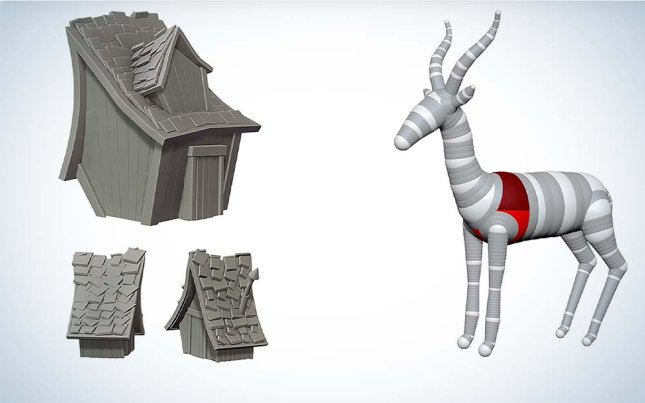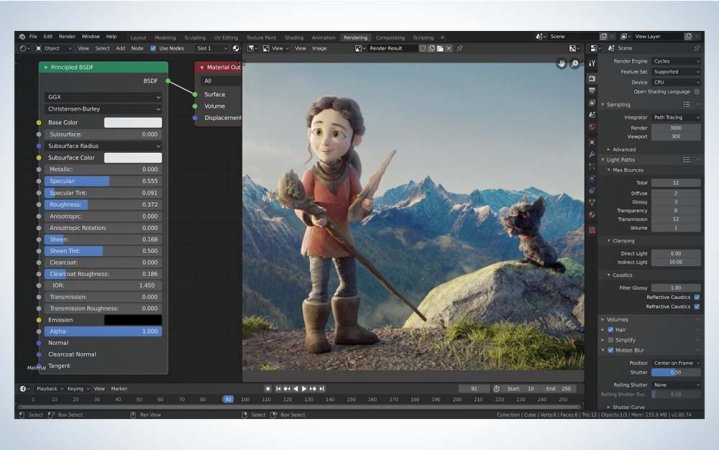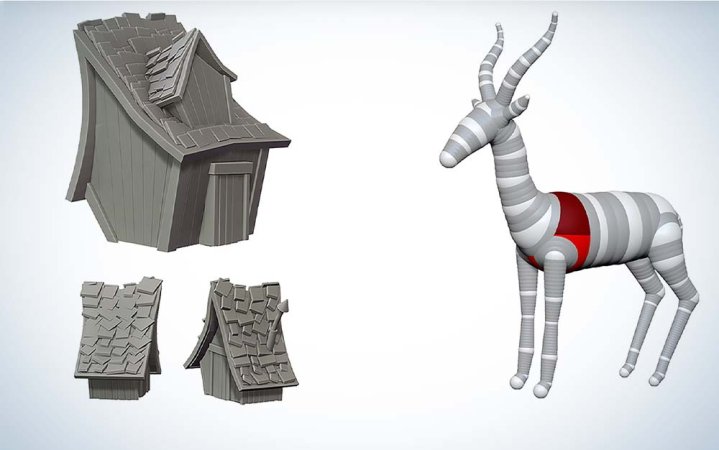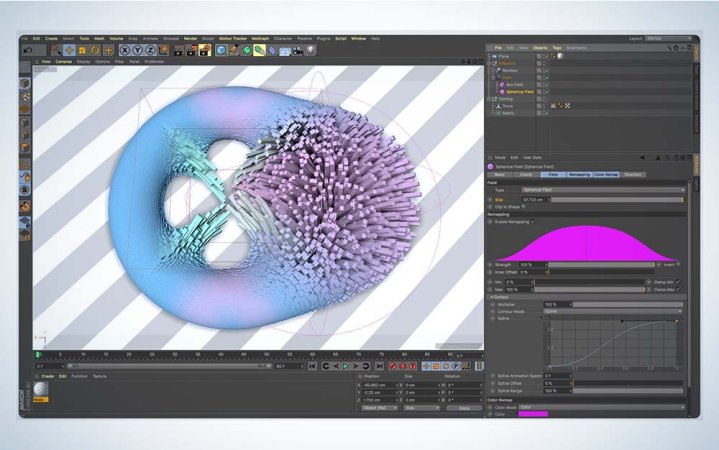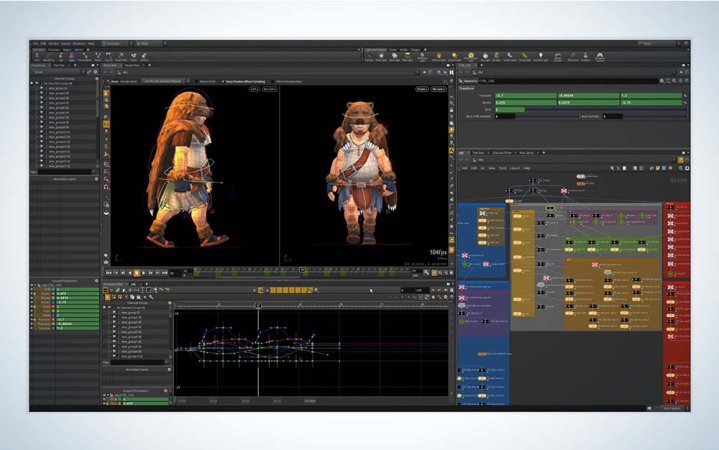We may earn revenue from the products available on this page and participate in affiliate programs. Learn more ›
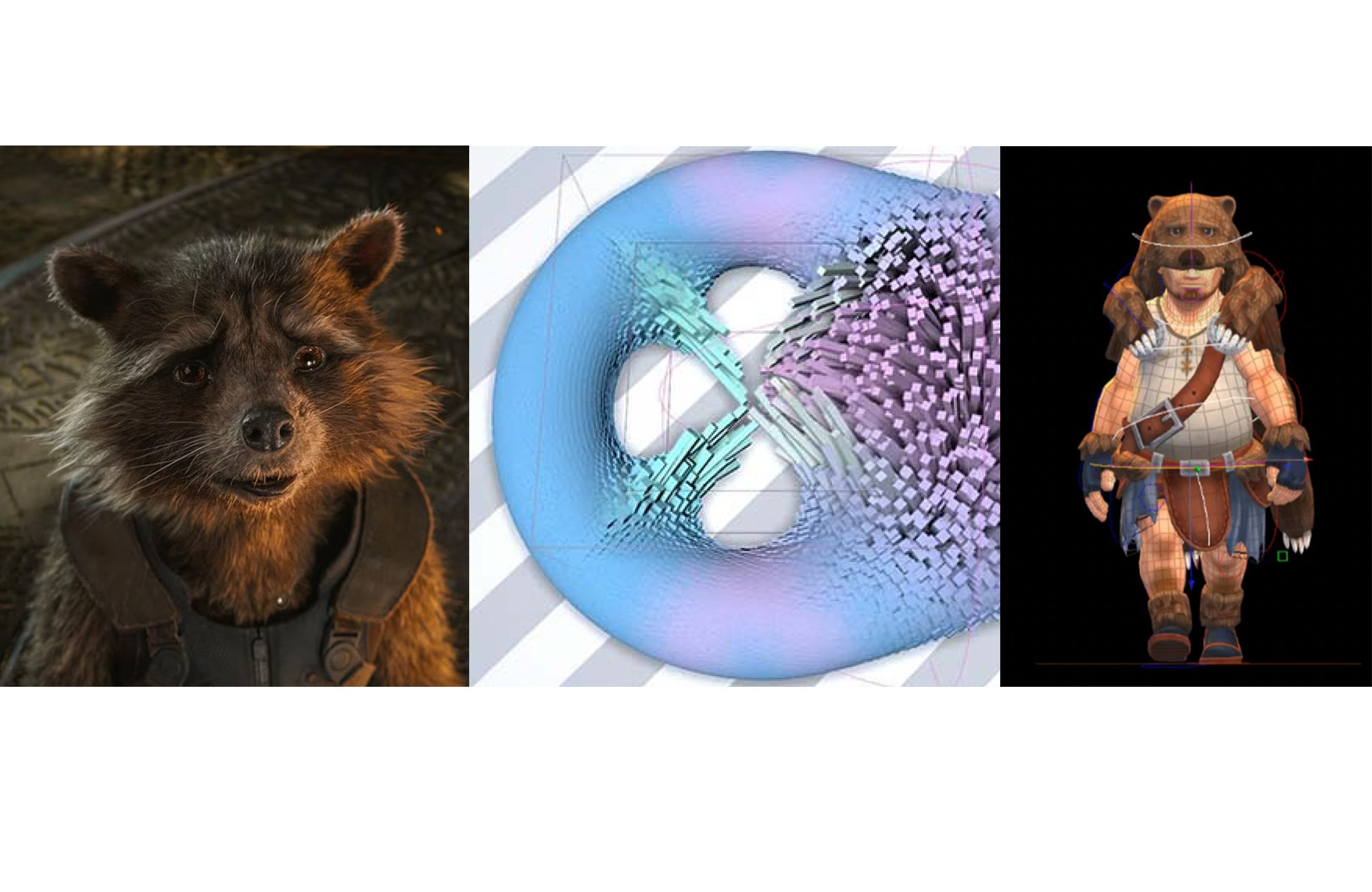
Over the years, the best 3D modeling software suites have been showcased in primarily two industries: the filmmaking industry, where they produce scores of fascinating computer-generated characters and amazing virtual environments, and the gaming industry, where they create incredibly realistic effects to allow users to feel immersed in the various gaming environments. Some of the top 3D software suites have been used for award-winning productions. For instance, they’ve been essential in creating some of the top blockbuster movies in the past 15 years, like The Lord of the Rings and The Hobbit trilogies, Avatar, and Guardians of the Galaxy, to name just a few. They’ve been particularly useful in creating science fiction, action and adventure, and animated movies.
But 3D modeling software is now being used in many other industries, too. For example, teachers and educators use 3D modeling software to produce compelling scientific concepts that engage students. In medicine, 3D modeling can produce more accurate, realistic representations, which may allow doctors to make better diagnoses, among other things. Moreover, many businesses will use this software to create virtual prototypes—and actual ones (via 3D printing). We’ve researched and selected the top 3D modeling software suites that will work for almost any digital artist’s needs or budget.
- Best overall: Autodesk Maya
- Best budget: Blender
- Best for digital sculpting: Zbrush
- Best for motion graphics and visual effects: Cinema 4D
- Best for organic simulations and visual effects: Houdini
How we chose the best 3D modeling software
I’ve written about many types of digital-imaging and animation software, from image- and video-editing software suites, as well as mobile apps, to animation software for a number of publications, including PCMag.com, Professional Artist magazine, Consumer Reports, The New York Times, Tom’s Guide, Artnews, and others. Additionally, I’ve taught digital animation and motion graphics. I brought my expertise in this area to help discover the best 3D modeling software. Additionally, I also looked at critical reviews and user recommendations and did a lot of research to narrow down our list.
I carefully considered several factors to find the best software suites, including ease of use, feature sets, operating system compatibility, and versatility.
The best 3D modeling software: Reviews & Recommendations
What’s striking about the 3D modeling software market is that although our top suites offer many similar features, there is a very broad price range: Users will have to pay more than a thousand dollars a year for some software suites or several thousand dollars for a perpetual license. However, they can also download Blender, which is free for the full version! Additionally, some software makers only offer subscription options for their software, which means you can’t buy a one-time perpetual license. So, whether you’re a novice or an expert, here are our top choices for 3D modeling software:
Best overall: Autodesk Maya
Best overall
Autodesk Maya
Specs
- Pricing: $235 per month, $1,875 per year, or $5,625 for three years
- Subscription Options: Subscription
- Free Trial: 30-day free trial
- Operating Systems: Windows, macOS, Linux
Pros
- Feature-packed and very versatile
- Sophisticated animations tools
- Powerful rigging tools
- Produces outstanding simulations
- Excellent tutorials
Cons
- Very expensive
- Interface can look intimidating for beginners
Although Autodesk Maya is indeed a very expensive software suite, it is definitely one of the best 3D modeling software apps on the market. It provides a host of deep 3D modeling tools and is considered the industry standard for professional-level 3D modeling software. It also allows animators and designers to create powerful animated characters in vivid, realistic, lifelike environments. It’s known for producing very natural-looking simulations of smoke, snow, fluids, particles, or other elements using its Bifrost plug-in. Like all the top 3D software packages here, Maya (version 24.1) has recently been updated to include enhancements to the time slider, skin cluster improvements, and the ability to delete multiple display layers. One of the best monitors for CAD could also be a valuable tool.
Best budget: Blender
Best budget
Blender
Specs
- Pricing: Free
- Subscription Options: N/A
- Free Trial: N/A
- Operating Systems: Windows, macOS, Linux
Pros
- Free feature-packed open-source software
- Great for beginners
- Interface is clean, clear and easy-to-understand
- Very versatile and customizable
- Strong community support
Cons
- Community structure of support could delay bug fixes
In the tech world, although free products are sometimes scorned as less capable and more confusing versions of those you pay for, Blender proves that free can be fabulous, which is why it’s one of the best 3D modeling software suites. In its current version (Blender 3.6 LTS), it has a much cleaner interface than past versions, but it’s packed with powerful 3D modeling modules: Character creation (using modeling and sculpting), texturing, animating (by creating an armature), applying visual effects, and rending, to name a few. It’s truly a polished, full-featured software package that will meet the needs of many creatives.
Best for digital sculpting: Zbrush
Best for digital sculpting
Zbrush
Specs
- Pricing: $29.91 per month or $359 per year for a subscription, or $895 for a perpetual license
- Subscription Options: Subscription and perpetual
- Free Trial: 14-day free trial (via Maxon One trial)
- Operating Systems: Windows, macOS
Pros
- Great for producing organic forms
- Very versatile
- Impressive collection of brushes
- New polygon modeling features for hard surfaces
Cons
- Software isn’t easy to learn
- Interface is somewhat unintuitive
- For best results, use a pen and tablet
If you’re wondering why Maxon ZBrush is one of the best 3D modeling software packages on the market, here’s one reason: In the same way that chiaroscuro (the treatment of light and shade in drawing and painting) made most of the iconic paintings of the Italian Renaissance come to life in 15th century, Maxon’s ZBrush allows digital artists to breathe life into digital characters, objects, and environments and sets the industry standard for digital sculpting and painting. It’s also why it’s used by film studios, game developers, toy/collectible makers, jewelry designers, automotive and aviation designers, illustrators, advertisers, and scientists. However, it’s not easy to learn, and some have found the interface to be somewhat unintuitive. But it is very versatile. For instance, you can free-form sculpt by pushing or pulling a virtual lump of clay or add various pieces of geometry to it. Or you can customize brushes to produce unique forms, shapes, textures, and paint.
Best for motion graphics and visual effects: Cinema 4D
Best for motion graphics and visual effects
Cinema 4D
Specs
- Pricing: $59.91 per month or $719 annually
- Subscription Options: Subscription
- Free Trial: 14-day free trial (via Maxon One trial)
- Operating Systems: Windows, macOS, Linux
Pros
- Very versatile
- Relatively easy to use
- Great toolset for motion graphics
- Integrates very well with other software suites
Cons
- Expensive
What many creatives like about Cinema 4D is that although it’s a powerful suite that’s great for 3D modeling, animation, simulation, and rendering, it’s relatively easy to use. In part, that’s due to its very clear structure as well as its intuitive tools. It’s used for a host of creative projects. One powerful area that Cinema 4D is a great tool for is motion graphics: With its Mograph toolset, you can use a powerful palette of tools to make fantastic flying logos to amazing abstract effects. You can also use those same tools to clone numerous objects and create extruded text simply and easily. But Cinema 4D is also great for animation since it has strong texturing, lighting, and rendering capabilities. It’s also a fast, powerful, flexible, and stable toolset used in everything from motion graphics, VFX, AR and VR, and game development.
Best for organic simulations and visual effects: Houdini
Best for organic simulations and visual effects
Houdini
Specs
- Pricing: $2,495 for an annual upgrade plan, or $4,495 for a perpetual license
- Subscription Options: Subscription and perpetual
- Free Trial: 30-day free trial (with Houdini Apprentice)
- Operating Systems: Windows, macOS, Linux
Pros
- Powerful node-based software structure
- Produces extraordinary visual effects
- Workflow allows changes to cascade through project
- Education and Learning licenses are great values
Cons
- Very expensive
- Not easy to learn
One of the things that’s made this software very popular with creatives is that it has a procedural node-based structure that allows creatives to produce dramatic changes to an entire project rather quickly and easily. It’s known for producing powerful organic simulations and visual effects. For example, with Pyro FX, the software can create incredibly realistic and vivid fire and smoke simulations. It’s also quite popular for its fluid and particle simulations and destruction effects. Its new Vellum technology allows creatives to quickly and realistically simulate how grains, hair, fur, and cloth react to other objects or stresses. And, although Houdini has made a name for itself in Hollywood with its remarkable simulation technology, it can also be useful for animation and modeling, as a lighting tool, and for character rigging.
Things to consider when buying the best 3D modeling software
It can be overwhelming for novices and experts alike when buying 3D modeling software since many apps offer a wide array of capabilities. In fact, since there’s quite a bit of competition in the 3D modeling software market, if a particular feature is missing in an app today, it might appear in the very next version of the software. So, before you buy, do some research on the software that’s available, and then ask yourself the following questions:
What’s your budget?
The best 3D modeling software can be quite expensive for a few reasons. First of all, some of the subscriptions for the software are pretty steep, as are the perpetual licenses. However, some apps have stripped-down versions that provide you some core features, without all the bells and whistles. Also, if you’re a student or teacher, you might be able to get the software at a discount. Additionally, if you have an older computer system, or one that doesn’t have a lot of power, you’ll need to buy new equipment, including accessories like a Wacom pad or other drawing pad. So make sure you factor that into your budget. Want to make the virtual into something tangible? You can find 3D printers under $1,000 and under $500, based on your budget.
What do you plan on using 3D modeling software for?
Since the 3D modeling software suites include the ability to do many tasks, make sure it includes the most important functions you’ll need to do your job. At the same time, find out if they have any ease-of-use features that can make tasks easier to do. Also, are you using it in your career or just as a hobby? If you’re not going to be using it professionally, you might not have as much pressure on you to learn it quickly.
What are your skills, and does the software meet your needs?
Are you an advanced power user? Or a beginner? Or somewhere in between? Some 3D modeling software can be customized to make it easier to use. If you’re advanced, see if it allows you to customize the interface, workspace, or other sections of the app. Be sure also to examine the user manual, help sections, access to video tutorials and training, and community support, all of which can really be invaluable when you’re confused about how to accomplish a task.
FAQs
Although Autodesk Maya is sometimes considered the industry standard software app for 3D modeling, the other top 3D modeling software in our list all offer very comparable feature sets and are almost as versatile.
It’s possible, but because most 3D modeling software is very complex, you may get easily frustrated. For example, almost all 3D software suites are packed with lots of features and modules, which can be accessed by interacting with a variety of elements, such as panels, toolbars, complex menu sets, sidebars, timelines, asset browsers, to name just a handful. So, simply learning the parts of the software alone can take a lot of time. That’s why learning from an experienced 3D designer or animator may provide you with a better learning experience. Try searching for video tutorials online for the software you’re hoping to learn.
Although a content creator might use the same tools for each task, there is a subtle difference between 3D designing and 3D modeling: A 3D designer is often responsible for producing a 3D visualization from various types of information, which is used to create an original 3D design. Once a 3D design is created, a 3D modeler uses that 3D design to create a more dynamic and detailed version.
Final thoughts on the best 3D modeling software
- Best overall: Autodesk Maya
- Best budget: Blender
- Best for digital sculpting: Zbrush
- Best for motion graphics and visual effects: Cinema 4D
- Best for organic simulations and visual effects: Houdini
As far as software goes, the best 3D modeling software package are among the most complex types of digital imaging or visual apps on the market. So, if you’re a novice, it can be very overwhelming. But take heart: If you’re just starting and unsure which software is right for you, begin by downloading one of them (or a few of them) and take some time to learn them. (Note: For some companies, like Maxon, you’ll need to set up an account in order to download the free trial.) That should help you get a feel for how the software works and if it’s a tool that will be useful for you. At the same time, find some tutorials online to help you get started since these apps tend to be very confusing.

